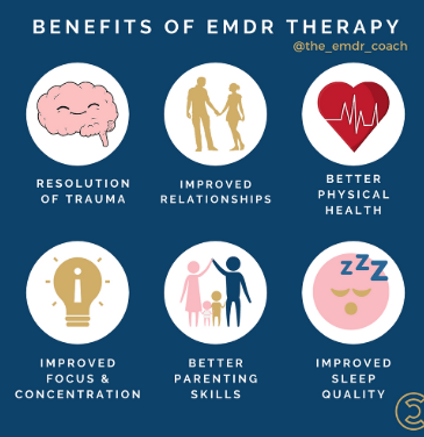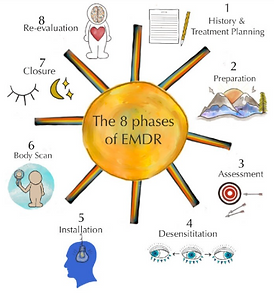EMDR


EMDR - Eye Movement Desensitisation and Reprocessing
Do you ever find yourself overreacting in your relationships, snapping, shutting down, or pulling away, even when you don’t really want to?
Often these intense reactions aren’t about the present moment at all. They come from earlier experiences that were never fully processed, and EMDR can help to change that.
EMDR is a powerful therapy that helps the brain and body reprocess painful experiences so they no longer have the same emotional grip. Using gentle bilateral stimulation (eye movements, tapping, or sounds), EMDR allows old memories to surface and be healed, releasing the charge that keeps them stuck.
Instead of just managing symptoms, EMDR works with both mind and body to bring lasting relief. Many people notice they feel calmer, safer, and more able to respond rather than react, especially in their relationships.
Here is a great video on how EMDR works on the brain
What can EMDR treat?
EMDR is best known for treating trauma and PTSD, but it is also highly effective for struggles that affect relationships, including:
-
Trust issues and fear of abandonment
-
Intense emotional reactions in conflict
-
Jealousy, insecurity, or fear of rejection
-
Difficulties with intimacy and closeness
-
Healing from betrayal or infidelity
-
Grief and loss within relationships
-
Shame, guilt, and low self-worth
-
Anxiety, panic, or shutdown during emotional conversations
-
Childhood experiences (e.g. neglect, criticism, parental conflict) that shape adult relationships

Attachment Informed EMDR
At Live Life Happy Therapy Nicola Griffiths, Founder and Director uses a relational approach to EMDR, influenced by the work of Laurel Parnell. This way of working recognises that many struggles in the present stem from early attachment wounds, experiences of not feeling safe, seen, or cared for as a child.
Attachment-informed EMDR puts emotional safety at the centre. It focuses on strengthening inner resources, healing negative beliefs (like “I’m not good enough” or “People will leave me”), and gently reprocessing old wounds. This approach is especially powerful when working with relationship difficulties, as it helps create healthier patterns of connection, trust, and intimacy.

Experience lasting relief—most clients see a 60–90% reduction in stress symptoms after completing EMDR treatment.











